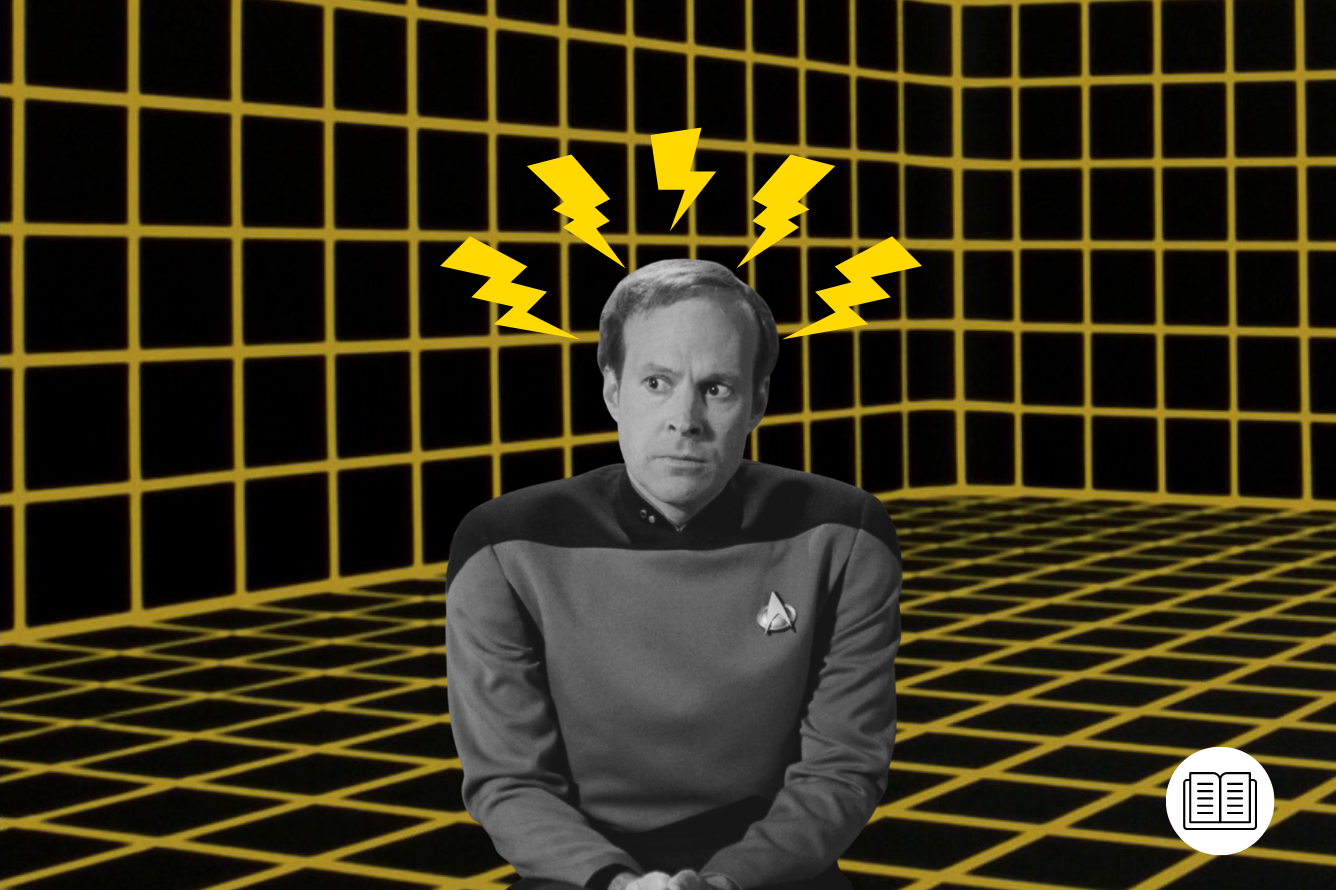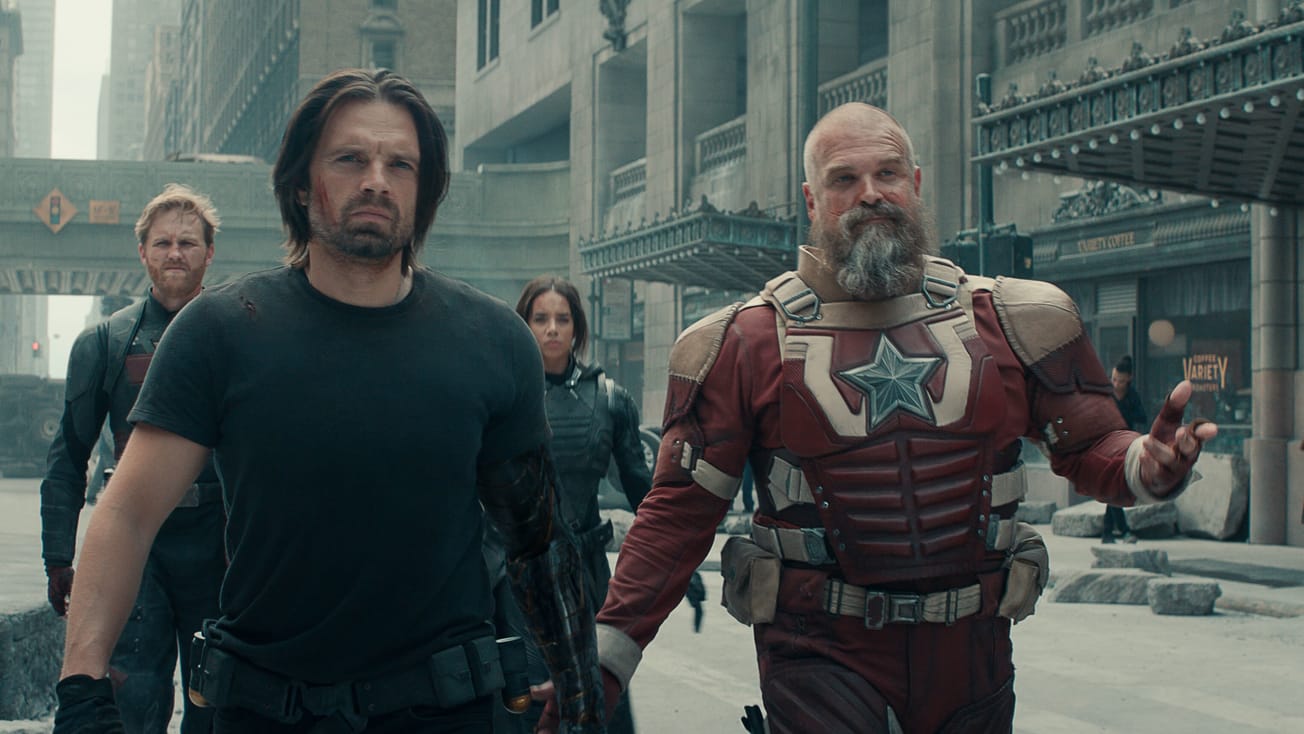In a 2001 interview for TV Zone magazine, life-long Star Trek fan Dwight Schultz reflected on the character of Lt. Reginald Barclay noting that he was “the lucky one chosen.” It’s a modest statement that implies Schultz is a Star Trek fan who won a competition, rather than a talented actor who got a dream role. However, Schultz’s journey to becoming the much-loved Star Trek character, and the resonance of Reg Barclay’s anxieties mirror the lives of many of us.
It’s true that sci-fi enthusiast Schultz lobbied executive producer Rick Berman and co-star Whoopi Goldberg for a role in Star Trek: The Next Generation. However, this wasn’t the needy prodding of an over-zealous fan, it was the work of an actor in search of a dream gig. At the time, Schultz was – and still is – best known as Howling Mad Murdock in The A-Team, so he more than earned his Special Guest Star credit, despite his modest belief he was merely “the lucky one chosen” to play Reg.
That modesty is characteristic of Reg Barclay, who is perhaps the most relatable and realistic Star Trek character ever created. Talking about the role with Star Trek Monthly in 1997, Schultz believed that Barclay was intended as exactly that – a recognisable human with believable responses to sci-fi situations, whom fans could identify with.
Fan identification figures in science fiction are fraught with difficulty, and Star Trek is no exception. Famously, Wil Wheaton’s Wesley Crusher went down badly with fans at home. It might have been a case of jealousy from some fans because this young kid got to be aboard Enterprise, and they didn’t. However, the way that Reg’s vulnerability and awkwardness resonated with viewers meant that he was largely embraced by Star Trek fandom, becoming a beloved recurring character.
Anxiety in TNG’s ‘Hollow Pursuits’
When he’s first introduced in the Star Trek: The Next Generation episode ‘Hollow Pursuits’ (S3, Ep21), Barclay has only recently transferred to the Federation flagship. Weirdly, Star Trek characters are rarely daunted by such a prospect. They beam aboard, perhaps have a bumpy initiation by way of a traumatic away mission, or in the case of Ensign Ro Laren (Michelle Forbes), interpersonal conflict with the senior staff. Barclay is the exception to this, and his anxiety is perfectly understandable.
In ‘Hollow Pursuits’ it’s clear that Reg is not fitting in; he’s often late on shift, can’t keep up with his workload, struggles to interact socially, and is too nervous to contribute ideas to staff meetings. Wesley Crusher, who should know better, is even talking about Reg behind his back.

Further Listening: Marina Sirtis Interview
14 Fiery Quotes from Marina Sirtis – Watch the Full Video | Star Trek royalty Marina Sirtis spills the Earl Grey on Deanna Troi, fighting for her voice, and why she left L.A. for London in To Boldly Ask…
To combat his social anxiety, Reg only withdraws further into himself, running holodeck simulations that allow him to act more confidently with Geordi (LeVar Burton), Riker (Jonathan Frakes), and Troi (Marina Sirtis). To treat social anxiety, mental health professionals advise writing down how you behave in certain situations and breaking down difficult or challenging situations into more digestible sections. In ‘Hollow Pursuits’, Barclay’s holodeck reconstruction of interactions with his fellow officers allows him to do just that, exploring alternative behaviours and responses. In the comfort of the holodeck, Barclay can take out his frustrations on Will Riker, aggressively throwing him around Ten Forward. In the real world, he meekly and apologetically stammers his way through each dressing down the Enterprise commander metes out to him.
It’s easy to see how Reg becomes addicted to this simulated reality where he can rehearse social interactions with his colleagues and live out a fantasy of being a more confident and assured version of himself. The comedian Nathan Fielder’s 2022 HBO show The Rehearsal allowed people to rehearse life events with the help of actors and staggeringly realistic sets. It’s essentially a real-world version of Reg Barclay’s use of the holodeck to cope with his social anxiety.

Further Listening: Jonathan Frakes Interview
Jonathan Frakes Defends Discovery – Watch the Full Video | Jonathan Frakes talks Star Trek: Discovery’s trolls, the brilliance of Blu del Barrio, and leading by example in our new video series, To Boldly Ask...
Reg’s obsessive use of the holodeck to tackle his anxiety is as much about becoming the man he wants to be as it is about improving his social skills. It becomes increasingly apparent throughout ‘Hollow Pursuits’ that Reg is an incredibly gifted engineer, who just struggles with his nerves and confidence. In the holodeck, he can be a swashbuckling charmer who has the confidence that Barclay knows he lacks in himself. He flirts with Counsellor Troi and gets his revenge on Wesley Crusher by dressing him as the foppish child from Gainsborough’s The Blue Boy. No wonder he gets addicted to a private and fictional world where he can live out his fantasies and punish his bullies. ‘Hollow Pursuits’ was never intended as a direct allegory for the experiences of Star Trek fans who seek solace in the show, but the parallels are all there. However, Sally Caves’ nuanced and sensitive script means that Barclay is a sympathetic and relatable character, rather than a bad-faith parody of the archetypal lonely Star Trek obsessive.
Imposter Syndrome in Voyager and TNG
Reg’s holodeck addiction (holodiction) is a symptom of his social anxiety and his own discomfort with his role aboard Enterprise. This addiction rears its head again when Barclay becomes obsessed with saving the stranded USS Voyager in the Star Trek: Voyager episode ‘Pathfinder’ (S6, Ep10). His obsession with proving his theory about interstellar communications with the Delta Quadrant manifests as an obsession with the holographic reconstructions of Voyager and its crew. Towards the end of the episode, Barclay loses faith in his theory and instead believes he’s having a holodiction relapse. This lack of self-belief is indicative of another relatable aspect of Reg’s character that stems from his time on the Federation flagship.

How many of us, like Reg, have received a promotion, or a high-profile job or have been accepted onto an academic course which had previously seemed out of reach? And how many of us have, rather than relaxing into this success, instead been plagued by self-doubt, concerned that we don’t deserve it? If we’re normal human beings and not narcissistic billionaire former President or the past two British Prime Ministers, most of us have experienced these doubts before. It’s called Imposter Syndrome and we’ve all experienced it in some form. It's a widely accepted form of intellectual self-doubt and was first identified by psychologists Suzanne Imes and Pauline Rose Clance in a 1978 research paper entitled The Imposter Phenomenon in High Achieving Women: Dynamics and Therapeutic Intervention. The paper theorised that “Despite outstanding academic and professional accomplishments, women who experience the imposter phenomenon persist in believing that they are really not bright and have fooled anyone who thinks otherwise.” In the intervening years, Clance published a follow-up paper that acknowledged Imposter Syndrome could affect everyone.
It certainly affects Reg Barclay who, like everyone else in the Rick Berman era of Star Trek is ridiculously intelligent and knowledgeable in his chosen field. However, unlike those Berman-era characters, Barclay’s Imposter Syndrome bars him from confidently voicing his often-vital scientific observations. For example, in Star Trek: The Next Generation episode ‘Realm of Fear’ (S6, Ep2), Barclay doesn’t immediately express his legitimate concerns about the life-threatening micro-organisms in the transporter field because he fears he won’t be taken seriously due to his phobia of the transporters.

The scenes in which Reg discusses his fears over something going wrong with the process of breaking down a body’s molecules and reconstituting them elsewhere is a perfectly rational fear for the viewers at home. However, in the fiction, Barclay is repeatedly assured that the transporter is the safest way to travel, and so he holds back key information out of embarrassment. This is classic Imposter Syndrome, despite Barclay’s proven skills in systems diagnostics, he doesn’t feel confident in properly expressing his fears and instead puts them down to his lifelong phobia.
Everyman Amongst the Starfleet Elite
Barclay was temporarily cured of his Imposter Syndrome in The Next Generation episode ‘The Nth Degree’ (S4, Ep19) in which he begins acting strangely after encountering an alien probe which miraculously boosts his intelligence and confidence. Although “strangely” is a bit of a stretch, because up until the moment he wires his brain into the Enterprise’s central computer, he acts as confidently as every other Berman-era Star Trek character.
Due to his encounter with the probe, Barclay becomes a chess genius and an incredibly talented actor. Extra-curricular excellence isn’t alien to Star Trek characters, Will Riker is a mean trombone player, Miles O’Brien (Colm Meaney) is an accomplished cello player, and Harry Kim (Garrett Wang) never misses an opportunity to whip out his clarinet. However, Reg’s burgeoning confidence and affecting performance as Cyrano De Bergerac is a cause for concern to the wider crew because it’s not what they expect of Reg Barclay. Though the senior staff put their concerns down to the fact that Reg has miraculously become the most advanced human being in existence, there’s also a sense of disquiet caused purely by the fact the shy, retiring Reg Barclay is more intelligent and more confident than all of them.

It's particularly telling when confronted by Geordi about his out-of-character behaviour, Reg replies “What, because I'm beginning to behave like the rest of the crew? With confidence in what I'm doing?” There’s an almost ruthless efficiency to the Starfleet of Rick Berman’s Star Trek, which would make for an incredibly intimidating workplace to enter. The original Star Trek had maritime and militaristic undertones in the likes of The Wrath of Khan (1982) and the TOS classic ‘Balance of Terror’ (S1, Ep14). However, Gene Roddenberry’s original vision was more in line with the frontier spirit, exploring the unknown wilderness and striving for a better future.
Further Reading on Wrath of Khan
Wrath of Khan at 40: Kirk's Mid-Life Crisis Enters Middle Age - Star Trek II: The Wrath of Khan shows an ageing Kirk struggling with relevance and purpose in a changing world – an experience mirrored by the series itself.
The Star Trek of the 1990s is much more like a slick military machine, with everyone being supremely confident in their roles as medics, scientists, pilots, and tacticians. There are arguments about duty rosters, efficiency targets, and in the Next Generation two-parter ‘Chain of Command’ (S6, Ep10-11) – a discussion about appropriate uniform standards. It’s telling, therefore, that the origins of Reg Barclay lie with series creator Gene Roddenberry.
The Legacy of Reg Barclay
Roddenberry was always keen that Star Trek present a vision of unity and accessibility to improve the future. The late Nichelle Nichols’ role was hugely influential on young Black women, something she later capitalized on in her work improving the diversity of NASA’s space programme.
So, who was there for viewers at home who felt that the super-slick, high-performance atmosphere of Enterprise-D was overwhelming and forbidding? It’s Roddenberry who’s cited as the person who wanted to create a character like Reg Barclay. Presumably, he wanted an audience identification figure to give a voice to those viewers who were struggling to find their own. In seeing Reg find his way among the crew of Enterprise, perhaps those shy and awkward viewers at home could find their own way at school or at work.
It’s also interesting that Reg Barclay was originally supposed to appear in the Next Generation episode ‘Lower Decks’ (S7, Ep15) which would later inspire the animated Star Trek comedy series of the same name. A character like Brad Boimler (Jack Quaid) is the successor to Reg Barclay’s legacy. Compared to Mariner (Tawney Newsome)’s super-confident Starfleet renegade, Boimler is a mess of neuroses and ambitions. As a risk taker, Mariner represents the Star Trek of Kirk while Boimler’s obsession with the rules and regulations represents the Star Trek of Rick Berman.
The most obvious comparison between Brad and Reg is in the Star Trek: Lower Decks episode ‘Kayshon, His Eyes Open’ (S2, Ep2) when Boimler gets transferred to the Titan, captained by Barclay’s former tormentor Will Riker. It’s everything that he believes he wants, a role on a Federation flagship. However, he soon discovers that it’s an incredibly stressful life facing constant battles with alien aggressors and all manner of weird sci-fi happenings. Boimler flounders under the pressure, experiencing Imposter Syndrome of his own, but eventually, he finds his way, like Reg Barclay before him. That is until he’s usurped by his far more confident transporter clone, William. Boimler’s Titan storyline in Lower Decks could very easily have been written for Reg Barclay back in the 1990s, given how it dovetails with Reg’s own internal struggles. It’s clear that, over three decades after his debut, Reg Barclay continues to resonate with Star Trek fans and writers to this day.
This article was first published on October 26th, 2022, on the original Companion website.
Further Reading on All Topics
- 14 Fiery Quotes from Marina Sirtis – Watch the Full Video | Star Trek royalty Marina Sirtis spills the Earl Grey on Deanna Troi, fighting for her voice, and why she left L.A. for London in To Boldly Ask…
- 14 Fiery Quotes from Marina Sirtis – Watch the Full Video | Star Trek royalty Marina Sirtis spills the Earl Grey on Deanna Troi, fighting for her voice, and why she left L.A. for London in To Boldly Ask…
- Wrath of Khan at 40: Kirk's Mid-Life Crisis Enters Middle Age - Star Trek II: The Wrath of Khan shows an ageing Kirk struggling with relevance and purpose in a changing world – an experience mirrored by the series itself.
- ‘The Measure of a Man,’ Data, and Defining A.I. Consciousness - In Star Trek: The Next Generation’s ‘The Measure of a Man’, Data’s right to life is upheld, but in the real world, A.I. consciousness is up for debate.
- The Science of Star Trek | Universal Translator Tech Is Pretty Close - Star Trek’s Universal Translator is almost within our grasp, but as The Next Generation makes only too clear: Shaka when the walls fell.










